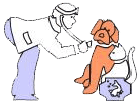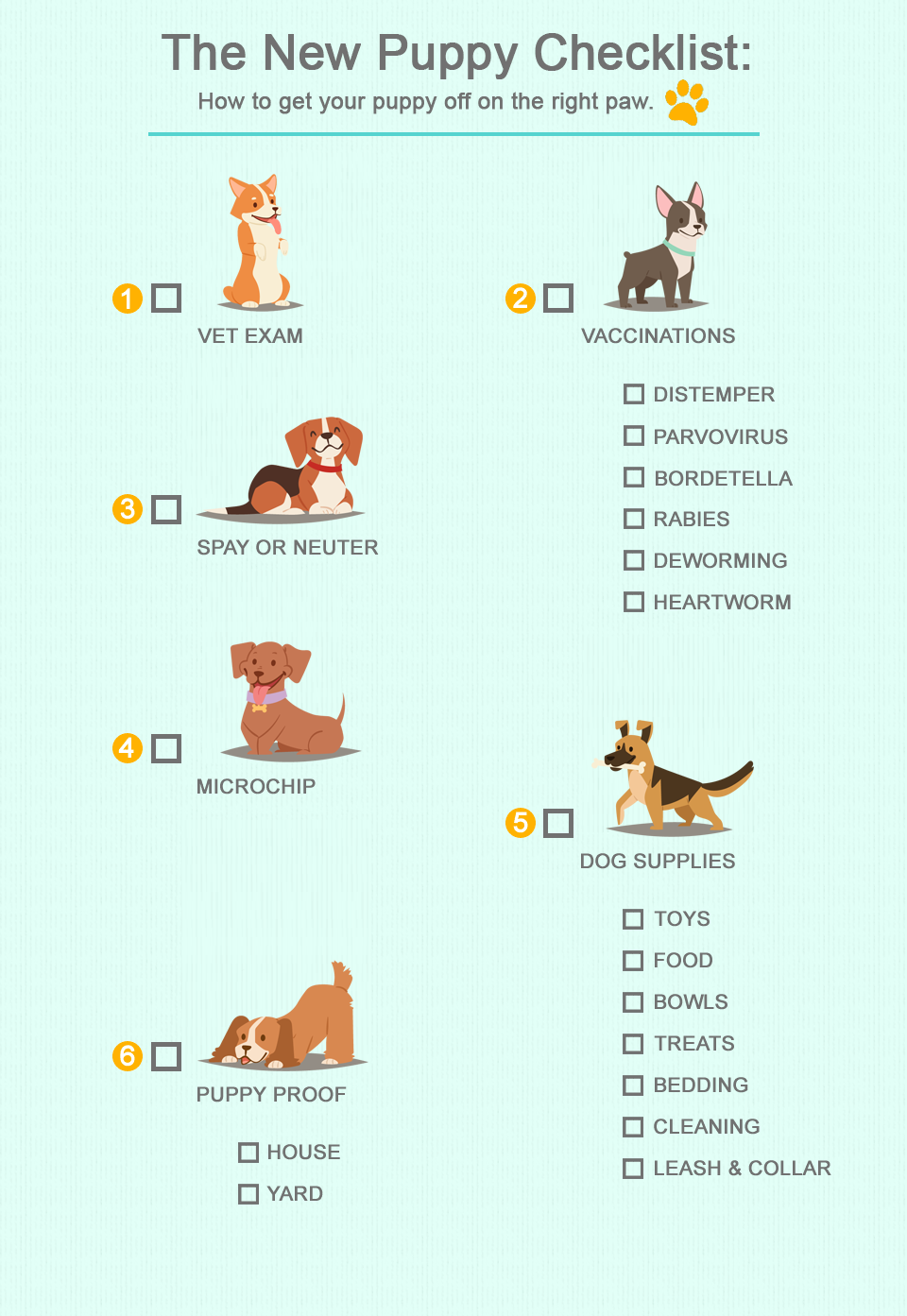Bringing home a new puppy is an exciting adventure, but it also comes with responsibilities to ensure they grow healthy and happy. Following our new puppy vet checklist will prepare you and your furry friend’s first vet visit.
This guide provides everything you need to know, including the importance of dog vaccinations, spaying, neutering, and microchipping, to ensure your puppy starts their life with the best care possible.
Your First Veterinary Appointment

Scheduling your puppy’s first veterinarian exam is essential for their health. Ideally, this should happen within the first week of bringing them home to establish a care routine.
Bring any documentation you received from the breeder, shelter, or rescue. This includes:
- Records: Proof of any shots your puppy has already received.
- Health Certificates: If provided, this helps the vet understand their health history.
- Adoption or Purchase Details: Useful for tracking breed-specific or genetic concerns.
Prepare a list of questions about your puppy’s care, including feeding schedules, behavior, and vaccinations.
Take note of any unusual behaviors your puppy has exhibited to discuss with the vet.
During this visit, expect:
| Check-Up Component | What Happens |
|---|---|
| General Health Exam | The vet checks weight, coat, and overall condition. |
| Vaccination Discussion | Create a schedule for required immunizations. |
| Parasite Screening | Tests for worms, fleas, and ticks. |
Please arrive a few minutes early to fill out paperwork, and ensure your puppy is on a leash or crate to keep them calm.
Vaccination Schedule
Puppies require a carefully planned vaccination schedule to stay protected from serious diseases.
A typical schedule might look like this:
| Age | Vaccines | Notes |
|---|---|---|
| 6-8 weeks | Parvovirus, Distemper | Initial doses |
| 10-12 weeks | DHPP (Distemper combo), Bordetella (optional) | Booster round |
| 14-16 weeks | DHPP, Rabies | Final core vaccines |
| Annually | Rabies, optional boosters | Based on vet recommendations |
Ask your vet for a detailed timeline tailored to your puppy’s needs and ensure each dose is completed on time.
Keep records updated, as they are often required for dog boarding or training classes.
Parasite Prevention
Parasite prevention is crucial for your puppy’s health. Start with a deworming plan to eliminate common intestinal parasites such as roundworms and hookworms.
For fleas and ticks, choose from topical treatments, flea collars, or oral medications. Many products offer broad-spectrum protection, targeting multiple parasites simultaneously. Consider monthly preventatives to ensure year-round safety.
Heartworm prevention is another essential step. Puppies as young as 8 weeks can begin receiving heartworm preventatives. These typically come as chewable tablets or topical treatments given monthly.
| Parasite | Prevention Options | Frequency |
|---|---|---|
| Intestinal worms | Deworming medication | Every 2-4 weeks (initial) |
| Fleas and Ticks | Topicals, collars, oral treatments | Monthly |
| Heartworm | Chewables or topicals | Monthly |
Recommended Vaccinations

Core vaccines include Parvovirus, Distemper, Hepatitis, and Rabies, which are essential for every puppy regardless of location or lifestyle.
Non-core vaccines, such as Bordetella (kennel cough), Lyme disease, and Leptospirosis, may be recommended based on factors like your puppy’s exposure to other dogs or environments with ticks.
Parvovirus
Parvovirus is a highly contagious viral disease that affects a puppy’s gastrointestinal system. It causes symptoms like severe vomiting, diarrhea (often bloody), lethargy, and loss of appetite.
It spreads through direct contact with infected dogs or contaminated surfaces like bowls or shoes. Puppies are especially vulnerable due to their immature immune systems. Without prompt treatment, parvovirus can be fatal.
Distemper
Canine distemper is a viral disease that attacks the respiratory, gastrointestinal, and nervous systems. Symptoms include fever, nasal discharge, coughing, vomiting, diarrhea, seizures, and even paralysis in advanced stages.
Distemper spreads through airborne droplets or direct contact with infected animals. It’s highly contagious and has no cure.
Hepatitis
Canine hepatitis, caused by the adenovirus, primarily affects the liver but can also harm the kidneys and eyes. Early signs include fever, vomiting, swollen abdomen, jaundice, and painful movement.
It spreads through contact with urine, feces, or saliva from infected dogs. While less common, it remains a serious and contagious disease.
Rabies
Rabies is a deadly viral disease affecting the brain and central nervous system. Initial symptoms include behavioral changes, drooling, and fever, progressing to aggression, paralysis, and death.
Rabies is transmitted through bites or scratches from infected animals. It’s nearly always fatal once symptoms appear, but vaccination is 100% effective in prevention.
Bordetella (Kennel Cough)
Bordetella, a key cause of kennel cough, is a highly contagious respiratory infection common in dogs exposed to crowded environments like shelters, grooming salons, or dog parks. Symptoms include a persistent, dry hacking cough, retching, nasal discharge, and mild fever.
While it’s rarely life threatening in healthy dogs, it can lead to severe complications in puppies or dogs with weakened immune systems. Bordetella spreads through airborne droplets or contact with contaminated surfaces.
Lyme Disease
Lyme disease is a bacterial infection caused by Borrelia burgdorferi, transmitted through bites from infected ticks. Symptoms include fever, swollen lymph nodes, joint pain, lameness, and lethargy.
If untreated, it can lead to kidney damage or neurological issues. While not directly contagious between dogs, the presence of infected ticks in an area increases risk.
Leptospirosis
Leptospirosis is a bacterial infection spread through water or soil contaminated by urine from infected animals, including wildlife. Symptoms range from fever, vomiting, and diarrhea to kidney or liver damage in severe cases.
It’s highly contagious to both dogs and humans (zoonotic), making prompt diagnosis and treatment crucial. Vaccination significantly reduces the risk of infection.
Spaying & Neutering

Spaying (for females) or neutering (for males) is a routine surgical procedure to prevent reproduction. The ideal age for sterilization depends on your puppy’s breed and size, with smaller breeds often sterilized earlier than large or giant breeds.
The spay and neuter benefits include reduced risks of certain cancers, such as mammary or testicular cancer, and prevention of unwanted pregnancies.
Behavioral benefits can include reduced roaming, marking, or aggression in males.
However, timing is essential, as spaying or neutering too early can impact growth in some breeds. Discuss with your vet to determine the optimal age for your puppy.
Microchipping

Pet microchipping is a simple and effective way to ensure your puppy can be identified if they are ever lost. The chip, inserted under the skin, contains a unique ID number that links to your contact details in a national database.
After microchipping, verify that the microchip is registered and your information is accurate.
Keeping this updated is crucial, especially if you move or change phone numbers.
Unlike collars or tags, microchips cannot fall off or be removed, making them a permanent identification method.
Diet and Nutrition Guidance

Feeding your puppy the right diet is essential for their growth and health. Look for high quality puppy food brands that meet AAFCO standards, ensuring they provide balanced nutrition for growth. Portion sizes vary based on your puppy’s age, weight, and breed.
Treats can also be used as training aids. Introduce age appropriate treats sparingly, ensuring they don’t make up more than 10% of daily caloric intake. This is important with pet obesity on the rise.
For puppies prone to food allergies or sensitivities, discuss options with your vet, including hypoallergenic or limited ingredient diets. Some common allergens include chicken, beef, and grains.
Consider supplements like omega-3 for skin and coat health or joint support for larger breeds.
Veterinarian Health Check Up
A thorough health check up ensures your puppy is growing strong and identifies potential health issues early. During this visit, the vet will examine your puppy’s eyes, ears, teeth, skin, and joints for signs of abnormalities or infections.
Be aware of some of the top dog health problems in your bread. Such as hip dysplasia in larger breeds or respiratory problems in brachycephalic dogs, should also be addressed.
If you’re unsure about your puppy’s breed, the vet may provide insights based on physical traits or recommend a DNA test for clarity.
| Health Aspect | What’s Checked |
|---|---|
| Physical exam | Eyes, ears, teeth, skin, joints |
| Growth monitoring | Weight checks and diet recommendations |
| Breed-specific risks | Screening for genetic predispositions |
Keep a record of all findings and discuss any concerns about your puppy’s behavior or development during the visit.
Printable New Puppy Vet Checklist
Frequently Asked Questions
What is usually given at a puppy’s first vet visit?
At a puppy’s first vet visit, the vet typically performs a physical exam to check their overall health, including eyes, ears, teeth, and coat. Vaccinations, like those for parvovirus and distemper, may be started if not already given.
Puppies are also often dewormed to address common intestinal parasites. A stool sample may be collected to check for additional parasites.
The vet will also discuss a deworming schedule, flea and tick prevention, and dietary recommendations.
How soon after I get a puppy should I take it to the vet?
You should take your puppy to the vet within the first week of bringing them home. This ensures they are healthy and free of parasites or other conditions.
The visit also allows the vet to establish a care plan tailored to your puppy’s age, breed, and health history. If you adopted from a shelter or breeder, bring any records they provided, for the vet to review.
When should newborn puppies go to the vet?
Newborn puppies should see a vet within their first 48 hours if possible, especially if they were born at home.
This initial visit checks their health, weight, and ensures no birth defects are present.
A follow up visit is usually recommended at 6-8 weeks for their first vaccinations and deworming. If the litter experiences any issues, such as difficulty nursing or signs of illness, an earlier vet visit is necessary.
 All About Pets
All About Pets 


